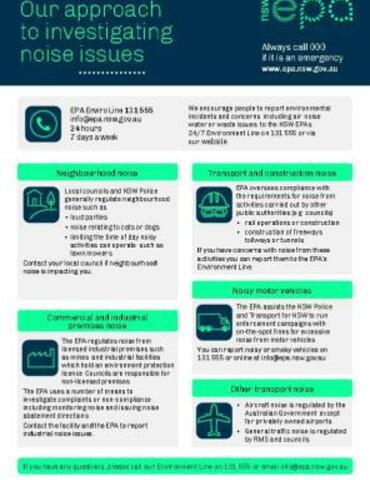Regulating noise
Noise can disturb sleep, cause irritation and undermine community goodwill. Learn how the EPA regulates industrial, construction and agricultural noise, and works with local councils and the police to ensure neighbourhood noise and noise from motor vehicles is controlled.
Neighbourhood noise
Local councils and NSW Police generally regulate neighbourhood noise under the POEO (Noise Control) Regulation 2017. The Regulation
- limits the time of day that noisy articles such as lawn mowers, stereos and leaf blowers can be heard in neighbouring residences
- sets noise limits on noise from motor vehicles and addresses noise from marine vessels
NSW Maritime enforces noise controls for marine vessels.
Noise relating to dogs and cats is regulated under the Companion Animals Act 1998 and administered by the Minister for Local Government.
The EPA has provided information on dealing with neighbourhood noise, including time limits on residential noise.
Motor vehicle noise
Under the POEO (Noise Control) Regulation 2017, on-the-spot fines can be issued for:
- vehicle exhaust systems exceeding specified maximum noise levels
- vehicle engines being louder than when originally manufactured
- equipment on motor vehicles being defective or not securely in place
- offensive vehicle sound system noise
- motor vehicle intruder alarms sounding for longer than permitted times
- noise from vehicle refrigeration units being heard in homes at night
- offensive noise levels from motor vehicles used off-road being offensive.
Maximum on-the-spot fines are:
- $600 for an individual
- $1,200 for a corporation.
The maximum court penalties that may be imposed when on-the-spot fines are transferred to court or are applied to repeat offenders are:
- $16,500 for individuals
- $33,000 for corporations.
Avoid having a noisy vehicle.
Industrial noise
The EPA regulates noise from licensed industrial premises under Schedule 1 of the Protection of the Environment Operations Act 1997 (POEO Act). If noise above scheduled levels is emitted from the premises because of the occupier's failure to maintain or operate the plant, or properly and efficiently deal with materials the EPA can use noise control notices, prevention notices and noise abatement directions to reduce or stop the noise
The maximum penalty for a noise control notice under the POEO Act is:
- $60,000 for corporations
- $30,000 for individuals.
(plus daily penalties for continuing offences).
The maximum penalty for a prevention notice is:
- $1,000,000 for corporations
- $250,000 for individuals.
(plus daily penalties for continuing offences).
The EPA also enforces the law regarding:
- noise from activities carried out by public authorities such as local councils and other government agencies
- rail noise
- noise from the construction of freeways and tollways.
Under the POEO (Noise Control) Regulation, the EPA regulates the size, design, formal and construction of noise labels.
For more information see updates to the Protection of the Environment Operations Legislation Amendment (Miscellaneous) Regulation 2023 on 17 February 2023.
Other noise
Noise from transport is handled by various agencies. As well as EPA regulation, Transport for NSW administers the Road Transport (Vehicle Registration) Regulation 2007that deals with safety risks from vehicle defects and installing appropriate silencing devices, among other issues.
Under the Road Rules 2008 administered by NSW Police, on-the-spot fines can be issued for:
- inappropriate use of horns or other warning devices under Road Rule 224
- starting or driving a vehicle so it makes excessive smoke or noise under Road Rule 291 (police officers can also issue 3 demerit points for this offence)
- not stopping the engine when the vehicle is stationary under Road Rule 291-1.
The EPA is continuing to assist the Police and RMS with enforcement campaigns relating to noise from motor vehicles.
Aircraft noise is regulated by the Australian Government, except for aircraft maintenance at privately operated or council-operated airports.
Noise from general traffic on roads is managed by Transport for NSW and councils.
Noise from individual vehicles is regulated by RMS, the police and the EPA.
Local councils can also control noise through:
- placing conditions in development consents issued under planning legislation
- through notices or directions under the POEO Act.
Download

Our approach to investigating noise issues Our approach to investigating noise issues
